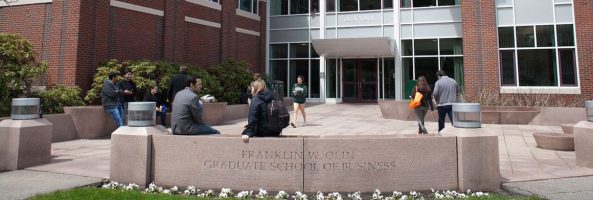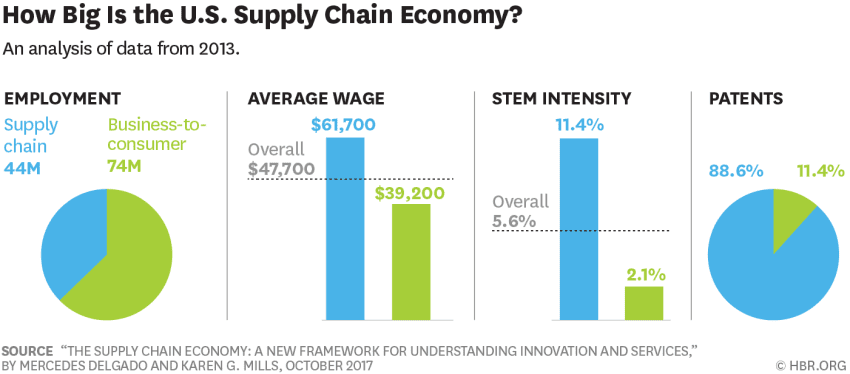Babson Entrepreneurship Stays at #1 for 25 Consecutive Years

For the 25th year in a row, U.S. News & World Report ranked Babson College’s F.W. Olin Graduate School of Business as the number one program for entrepreneurship in the United States. Entrepreneurship is an indelible part of the business school and MBA program, found within the curriculum, faculty, clubs, centers, and more.
Babson’s Entrepreneurship Curriculum
At Babson, the 50-plus faculty members and 30 adjunct entrepreneurs—the largest dedicated entrepreneurship faculty in the world—come together to teach Entrepreneurial Thought & Action®. This methodology is a way to balance action, experimentation, and creativity with business fundamentals. The goal is to empower students to take action on social, economic, and environmental issues to create value. Students are taught to apply ET&A™ in everything from large corporations to running a charity, solving social issues, and starting a business.
In addition, at Babson, there’s the idea that “we are all entrepreneurs,” which falls under the Entrepreneurship of All Kinds® heading. This concept re-imagines entrepreneurship to include all brilliant improvisers, not just startups, venture capital firms, and business incubators. It looks at how every organization can use entrepreneurship to creatively solve problems and adapt to change.
Both ET&ATM and Entrepreneurship of All Kinds® are interwoven into the very fabric of Babson, being taught in every classroom and every topic.
Babson’s Entrepreneurship Focus
Outside of the curriculum and academic philosophy of Babson, entrepreneurship can be found in dedicated centers and other resources. For example, the school is home to the Arthur M. Blank Center for Entrepreneurship, which helps to accelerate the practice of entrepreneurship through mentoring, competitions, events, workshops, and more. This Center is the hub of the entrepreneurial ecosystem.
There’s also the John E. and Alice L. Butler Launch Pad, which hosts two signature entrepreneurship events every year: the Rocket Pitch and B.E.T.A. Challenge both of which bring together students and alumni to compete in business innovation. The Launch Pad is also responsible for the Summer Venture Program, which accelerates the top 15 student ventures at Babson each year.
To gain more in-depth insight into Babson’s entrepreneurial focus, we had the opportunity to interview Keith Rollag, the Dean-Elect of the Graduate School (starting July 1). He was able to talk to us about how Babson has been able to stay as the number one program for entrepreneurship for 25 years as well as what that looks like at the university.
-
How has the Babson MBA managed to maintain the #1 entrepreneurial slot for so long?
There are several reasons; some of it comes from our first-mover advantage. We taught our first course in entrepreneurship in 1967, and created the Center for Entrepreneurial Studies in the 1970’s at a time when entrepreneurship wasn’t really accepted as a separate business discipline. We started the Babson Entrepreneurship Research Conference in 1981 (which continues to be one of the premier conferences for entrepreneurship) and the Price-Babson Symposium for Entrepreneurship Education in 1984, which over the years has taught almost 5000 educators from over 1000 institutions and 80-plus countries how to teach entrepreneurship.
But our #1 ranking is also due to the creation of a Babson community, culture, and curriculum that is built around entrepreneurship. Entrepreneurship has been an important part of our curriculum since the 1980’s, and we’ve built what we think is the largest entrepreneurship department in the world with over 50 full-time and adjunct faculty members.
Entrepreneurship has been a part of our Babson DNA for decades, and we live it as well as teach it. We are constantly updating our curricula, trying new things, building new partnerships, and exploring new opportunities. The term Entrepreneurial Thought and Action is the latest embodiment of this spirit, and it aptly implies the energy and enthusiasm that is an integral part of Babson.
-
Why do you feel that Entrepreneurial Thought & Action is vital to an MBA education?
At its core, Entrepreneurial Thought and Action is all about rapid learning, and in today’s dynamic world of uncertainty, whoever learns fastest wins. We teach our students to know when to learn quickly through analyzing, strategizing, and planning, and when to learn quickly through prototyping, experimenting, interacting with customers. Both are critical for success, but our education and reward systems tend to favor thinking and discussing over acting. We know from the habits of successful entrepreneurs that in times of high uncertainty, action (and the learning that comes from it) is the best way to solve problems and take advantage of emerging opportunities.
In our Babson MBA programs, we help students develop both a mindset and habit of learning through action. This is valuable whether you are trying to lead innovation within large corporations, grow and expand small and medium-size businesses, create new ventures, or simply find new ways to address complex-but-important problems facing communities, regions, and the world.
Learning quickly is a skill that will always be valued by organizations. While markets, technologies, structures, and roles may change, the need for a manager to learn quickly will never go away.
-
What aspect of your entrepreneurship studies/opportunities/focuses would you like to highlight?
We do many things under the broad heading of “entrepreneurship of all kinds.” Students have the opportunity to participate in intensity tracks around entrepreneurship (where they can build their venture while they are getting an MBA), women-led entrepreneurship, social innovation, and technology development. We also have the Butler Launch Pad as well as our highly competitive Summer Venture Program that helps start dozens of ventures (both business and social-focused). And our MBA students have several clubs focused on regional entrepreneurship and host well-attended conferences on United States, Asian, Indian, and Latin American entrepreneurship.
Whether one is considering starting a company or looking to lead ventures within larger organizations, or just wanting to maximize their impact on the world, an entrepreneurial, can-do, action-oriented mindset primes everyone for success.
New Harvard Venture Competition Receives Record Entries to Social Enterprise Track

The annual Harvard Business School (HBS) New Venture Competition—and its more than $300,000 in cash prizes—always attracts plenty of interest. Sponsored by the Rock Center for Entrepreneurship and Social Enterprise Initiative, it offers Harvard Business School students the opportunity to enter ventures in one of two tracks:
- Business Track: For ventures that drives substantial market value and economic returns.
- Social Enterprise Track: For ventures that drive social change through nonprofit, for-profit, and hybrid models.
This year, there were a record 69 entries for the Harvard Venture Competition Social Enterprise Track—20 more than last year!
From those 69 entries, a team of expert social enterprise leaders from across Harvard was able to choose 16 semifinalists. These semifinalists have already passed an extensive review and deliberation process and will now present their ideas in front of a panel of expert judges that include philanthropists, impact investors, and social entrepreneurs.
The final presentation will occur on April 18, with each semifinalist team vying for the $75,000 grand prize and $25,000 runner-up prize. As enticing as those cash prizes are to students with ventures they’re looking to launch, all participants enjoy the many following benefits:
- Access to a series of workshops and office hours covering topics such as “how to develop a social enterprise plan” and “identifying the market for social ventures;”
- The catalyst to develop a business plan and executive summary, which will be required for the final presentation;
- Feedback from expert judges out of leading social organizations such as ACCION International, Echoing Green, and Invested Development, and
- Reimbursement of up to $1,000 in startup expenses.
Without further ado, here are the 2018 Social Enterprise Track semifinalists:
- C3 Solutions: A carbon capture company
- CareZoom: An online platform for healthcare delivery
- Covalent Networks: A software platform for workforce development programs
- Dignify: A digital network matching refugees and locals
- EatWell: A healthy eating company for low-income families
- Fontes Irrigation: On-demand irrigation for farmers in Mozambique
- Hoom: A smart, sustainable $10,000 home
- ImmerLearn: Use machine learning and novel data to maximize the effectiveness of social and public programs.
- Joro: An app for tracking CO2 emissions
- Neptune: A better grease trap
- OnTrack Births: Providing access to quality maternal care in India
- SHLD: A Snapchat program that provides teens with wellness tips and suicide prevention
- STEMgem: An IoT device toolkit
- Trey: Empowering college athletes for future success
- Umbulizer: A low-cost, portable ventilator for patients
- UPON: Eliminate labor underutilization and increase women’s access to the workforce.
To learn more about each of the semifinalists, read the HBS Impact Insights Blog post.
This article has been edited and republished with permissions from our sister site, Clear Admit.
MIT Sloan Student Travel Goes Carbon Conscious with Jetset Offset Program

Over spring break, 100 MIT Sloan students will travel the world to study while immersing themselves in different cultures. It’s a wonderful opportunity with one problem. There’s a pretty significant carbon impact—300 metric tons of carbon dioxide to be exact. But now, a new Jetset Offset pilot program could help lessen that negative impact.
When we fly, we can’t choose the energy efficiency of our plane, but that doesn’t mean we shouldn’t travel. Instead, it means we should try to lessen our impact on the environment by purchasing carbon offsets, and that’s exactly what the Jetset Offset program does.
In its first year, the pilot program will purchase carbon offsets for four study tours over spring break 2018—three MBA groups and one Master of Finance group. The carbon offsets will take the form of projects that help with carbon emissions. Such projects include reforestation or building renewable energy sources.
According to Yakov Berenshteyn, a ‘19 Leaders for Global Operations Fellow and the creator of the Jetset Offset program, while the impact might not be immediate, it’s a step in the right direction. “This is raising awareness of, and starting to account for, our environmental impacts from student travel,” he said.
The idea for Jetset Offset came about after Berenshteyn realized how many air miles students and staff were logging. In January, for the two-week Leaders for Global Operations Domestic Plant Trek, MIT logged more than 400,000 miles. Berenshteyn couldn’t help but think that there needed to be a counterbalance to all the burned jet fuel. After talking to MIT Sloan Professor John Sterman, he realized that applying carbon offsets and carbon-neutral practices was the best way to make a difference. Duke University had already implemented such a program.
So, for the January trip, the Leaders for Global Operations program purchased 67 metric tons of offsets through Gold Standard, which will go toward reforestation efforts in Panama. For future MIT Sloan trips, the MIT Sloan Student Life Office will pick up the tab.
“Yakov’s idea is exactly the kind of student initiative we love to support,” MIT Sloan associate director of student life Katie Ferrari said. “He is practicing principled, innovative leadership with an eye toward improving the world.”
To read the full news release, visit the MIT Sloan Newsroom.
This article has been edited and republished with permissions from our sister site, Clear Admit.
MIT Explores Happiness, and More – Boston News

Let’s explore some of the most interesting stories that have emerged from Boston business schools this week.
Probing the Origins of Happiness – MIT Newsroom
On the #InternationalDayofHappiness, Kara Baskin at the MIT Sloan School of Management explored the new book “The Origins of Happiness: The Science of Well-Being over the Life Course,” which was co-authored by MIT Sloan Ph.D. student George Ward. Talking about his work, Ward explains how global governments have been attempting to tap into the data of happiness in hopes of shaping future policies.
“We wanted to bring together this body of work in a systematic, quantitative way,” he explains. “Often, these are single studies that say ‘x’ is important for happiness; ‘y’ is important for happiness. In this book we try to provide an overarching framework that documents what makes for a satisfying life.”
“On the policy side,” he continues, “more and more countries are using well-being data in the real world. As we speak to policymakers, they often ask the question: ‘Look, we’re measuring this now and we have the impetus to improve these figures, move up these tables of happiness, and make our citizens enjoy their lives more. What can we do?'”
You can read the rest of the Ward interview here, and grab a copy of “The Origins of Happiness: The Science of Well-Being over the Life Course” today.
The Supply Chain Economy and the Future of Good Jobs in America – Harvard Business Review
The Harvard Business Review recently published an article from Mercedes Delgado and Karen Mills that outlines the increased role service suppliers will play in what some have dubbed the “supply chain economy.” Supply chain industries are simply “businesses that manufacture parts to be used in a final good,” like plastic injection molders and metal stampers.

These industries “have a crucial role in driving innovation and creating well-paying jobs,” in part because they “have downstream linkages to multiple industries, which allows the innovations they create to cascade and diffuse across the economy, potentially increasing the value of those innovations.”
Read more about HBS’ policy suggestions to emphasize “suppliers’ access to skilled labor, buyers, and capital” here.
BU Grad Schools Among Nation’s Best – BU Today
Several schools in the Boston metro saw a nice rankings boost in the recently release U.S. News & World Report Best Business Schools 2019 list, with the Questrom School of Business at Boston University leaping up two spots overall from last year, up to 42nd overall. The school’s part-time program also finished 10 spots better than last year, coming in 32nd overall.
In a release, Kenneth Freeman, Allen Questrom Professor and Dean in Management, said, “Rankings are inherently imperfect, but we appreciate the acknowledgement of the quality and reputation of our students, program, and alumni. Each year, we adjust our curricular content in response to student needs and our increasingly engaged corporate partners to create experiential opportunities to bridge the classroom and industry.”
You can catch up on the rest of BU’s graduate schools in the new ranking here.
Harvard Black Business Leaders Series Celebrates Black History Month

To commemorate Black History Month, Harvard Business School presented a series of cases, courses, and podcasts highlighting influential black business leaders. Within its MBA curriculum, HBS has also been working to increase the representation of compelling African-American protagonists culled from a wide range of industries in the case studies at the heart of its distinctive case study method.
Senior Lecturer Steven Rogers (no not that one), who teaches the course “Black Business Leaders and Entrepreneurship,” was one of the catalysts for this initiative. Rogers uses his course as an opportunity to honor the unsung impact that many African-American business leaders have had on the way America does business. As part of the Black Business Leaders Series of podcasts, Rogers interviews living African-American leaders about the dizzying highs and devastating lows of doing business.
John Rogers Podcast
One such interview features Ariel Investments Founder, Chairman, and CEO John Rogers (no relation), whose financial management firm handles about $13.1 billion. Ariel currently has 90 employees and considers itself a miniature version of Fidelity. “John Rogers is one of America’s great entrepreneurs,” says Steven Rogers by way of introduction. “In the words of Warren Buffett, he is one of the greatest investors of our time.”
The podcast delves into John’s vocal criticism of diversity in Fortune 500 companies and how his comments got him in trouble with his board. It also discusses such topics as a severe lack of inclusion present in the financial management industry. It’s a problem that impacts the entire sector, from job creation to community health.
“When African-American–owned companies are allowed to prosper and grow, we see the creation of more jobs,” Steven Rogers explained in the podcast. “When people have jobs, they’re self-sufficient. When people are self-sufficient, they live in healthy communities. That’s exactly what happens when diversity and inclusion is actualized and people like John are given a chance to grow their companies.”
To listen to the full podcast visit the school website.
Black Business Leaders Series Highlights
Don’t miss these other great podcasts in the HBS Black Business Leaders series:
- A discussion of Ebony Magazine, which for more than seven decades has chronicled the most important African-American issues and interests of the time.
- An interview with Senior Lecturer Henry Q. McGee on the topic of “The Black List” in Hollywood.
- An in-depth look at the legacy of Maggie Lena Walker and the Independent Order of St. Luke.
To access the complete Black Business Leaders Series, visit the HBS Newsroom.
This article has been edited and republished with permissions from our sister site, Clear Admit.
School v. School: Harvard Business School or MIT Sloan?

When selecting an MBA program, it can be difficult to cut through the fog to make the best long-term decision. For elite schools, the veil of prestige casts a long shadow. For lesser-known schools, it’s often a question of how much bang you’re getting for your buck. Allow our School v. School series to do the heavy lifting for you and present an in-depth comparison. Let’s consider the distinctions between Boston’s best: Harvard Business School and MIT Sloan.
Harvard Business School
Located in the Allston neighborhood of Boston, Harvard Business School’s 40-acre campus is “the only top business school in the United States with a self-contained, residential campus,” steps away from the downtown area of the city. HBS is famously one of the first MBA programs in the world. It also boasts one of the largest total student populations, with a grand total of 1,871 enrolled students.
HBS Full-Time MBA
For many, HBS is the crème de la crème of MBA programs. U.S. News and World Report ranks it as the best in the country. HBS offers only one type of MBA degree: full-time. The program lasts a typical two years, with the first summer break reserved for an internship or internships. Due to the large student body, incoming students are divided into groups of 90 who will take the same coursework for a year’s time. Each segment represents the diversity of the incoming class.
Why HBS?
- The FIELD Foundations program (Field Immersion Experience for Leadership Development) helps students develop an awareness of their leadership styles by interacting with their “team” through intimate workshops. The program, which intends to build emotional intelligence, is unique for its personalized approach to business training.
- The Case Method was first established as the primary method of instruction at HBS, and many students cite it as a highlight of their time at HBS. The Case Method puts students in the position of the decision makers by presenting scenarios written by HBS staff themselves.
- HBS offers six joint degree options for students looking to expand into additional fields, such as law, medicine, and engineering.
- HBS routinely tops MIT when it comes to domestic and global MBA rankings.
Harvard vs. MIT MBA Rankings
| Harvard Business School | MIT Sloan School of Management | |
|---|---|---|
| U.S. News & World Report (U.S.) | 1 | 4 |
| The Economist (Global) | 3 | 19 |
| Financial Times (Global) | 5 | 9 |
| Forbes (U.S.) | 3 | 8 |
| Bloomberg Businessweek (U.S.) | 1 | 3 |
What Is Missing?
- There’s a hefty price tag for a HBS education: estimated at $106,800 annually, including tuition, room and board, materials, and healthcare.
- Outside of the U.Ss, starting salaries for international positions tend to be lower, despite Harvard’s reputation in the States.
- Harvard’s employment rate after graduation trails slightly behind MIT: 91 percent vs. MIT’s 93 percent.
- Out of 273 faculty members at HBS, only 70 are women; about 25 percent.
MIT Sloan School of Management
Situated in nearby Cambridge, the Sloan School of Management campus is “surrounded by biotech companies, tech giants, startups, and research labs.” MIT Sloan has a compact center for its MBA students, which revolves around a newly built facility called E62. Here, you’ll find the entire faculty and most academic programs. Its population of full-time MBA students hovers around 800, while 500 additional students are completing alternative post-baccalaureate business degrees.
Sloan School of Management Programs
Unlike HBS, MIT Sloan offers three kinds of MBA programs: the two-year, full-time MBA degree; 20-month Executive degree; and 12-month Sloan Fellows Program. The full-time MBA degree stands out for its Sloan Innovation Period (SIP), a full-immersion learning experience that occurs in the middle of each semester. Students take a week-long hiatus from classes to attend lectures, travel abroad, visit host companies, and more.
Why Sloan?
- The Global Entrepreneurship Lab is one opportunity that MBA students shouldn’t miss. Students act as advisors for start-up companies in markets around the world, delivering insight on topics such as “strategic growth, new market entry, pricing, marketing, benchmarking, fundraising, and financial strategy.”
- The Leaders for Global Operations caters to students interested in a dual degree in Engineering and Business. This two-year curriculum “places students in research internships at elite partner companies.”
- Sloan’s MBA class is made up of a larger international student base compared to Harvard; 39 percent, as opposed to 35 percent at HBS. This isn’t a significant gap, but it does show MIT’s commitment to diversity.
What Is Missing?
- According to Forbes, Sloan has a lower median base salary after graduation at $125,000. HBS grads average around $135,000.
- Unlike the HBS environment, not all students on campus are earning full-time MBA degrees. If you’re someone who enjoys working with the same student body throughout your degree, prepare for a bit more cross-section here.
- The current tuition and full cost for the MIT Sloan MBA is slightly higher than HBS (regarding non-married single students with no children).
Harvard vs. MIT MBA Cost
| Harvard Business School | MIT Sloan School of Management | |
|---|---|---|
| Tuition | $73,440 | $74,200 |
| Full-Cost | $109,124 | $111,570 |
When all is said and done, both MBAs are extremely cutting-edge programs that any ambitious prospective b-schooler would salivate over. Both Harvard and MIT offer a similar urban setting, as they exist in the same tightly packed university community in Boston. Additionally, both have the same acceptance rate (11 percent). For a final push, be sure to read up on faculty leading the way both at Harvard and MIT.
